1936 Summer Olympics
| Games of the XI Olympiad | |
| Host city | Berlin, Germany |
|---|---|
| Nations participating | 49 |
| Athletes participating | 3,963 (3,632 men, 331 women) |
| Events | 129 in 19 sports |
| Opening ceremony | August 1 |
| Closing ceremony | August 16 |
| Officially opened by | Chancellor Adolf Hitler |
| Athlete's Oath | Rudolf Ismayr |
| Olympic Torch | Fritz Schilgen |
| Stadium | Olympic Stadium |
The 1936 Summer Olympics, officially known as the Games of the XI Olympiad, an international multi-sport event which was held in 1936 in Berlin, Germany. Berlin won the bid to host the Games over Barcelona, Spain on April 26, 1931, at the 29th IOC Session in Barcelona (two years before the Nazis came to power). It marked the second and final time that the International Olympic Committee would gather to vote in a city which was bidding to host those Games. The only other time this occurred was at the inaugural IOC Session in Paris, France, on April 24, 1894. Then, Athens, Greece, and Paris were chosen to host the 1896 and 1900 Games, respectively.
The bidding for these Olympic Games was the first to be contested by IOC members casting their votes for their favorite host city.[1] Here was the result of that inaugural voting.
| 1936 Summer Olympics Bidding Results | ||||||
|---|---|---|---|---|---|---|
| City | NOC | Round 1 | ||||
| Berlin | 43 | |||||
| Barcelona | 16 | |||||

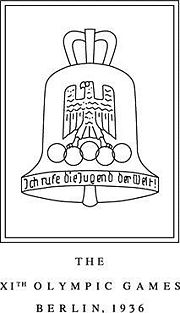
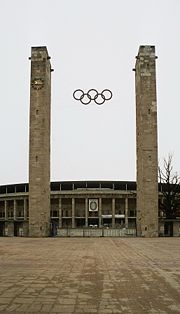
Filmmaker Leni Riefenstahl, a favorite of Hitler's, was commissioned by the IOC to film the Games. Her film, entitled Olympia, introduced many of the techniques now common to the filming of sports.
By allowing only members of the Aryan race to compete for Germany, Hitler further promoted his ideological belief of racial supremacy. At the same time, the party removed signs stating "Jews not wanted" and similar slogans from the city's main tourist attractions. In an attempt to "clean up" Berlin, the German Ministry of Interior authorized the chief of police to arrest all Romani (Gypsies) and keep them in a special camp.[2] Nazi officials ordered that foreign visitors should not be subjected to the criminal strictures of anti-homosexual laws. Total ticket revenues were 7.5 million Reichsmarks, generating a profit of over one million marks. The official budget did not include outlays by the city of Berlin (which issued an itemized report detailing its costs of 16.5 million marks) or that of the German national government (which did not make its costs public, but is estimated to have spent US$30 million, chiefly in capital outlays).[3]
Contents |
Nazi influence on and use of sporting events
Organization
Hans von Tschammer und Osten, as Reichssportführer, ie. head of the Deutscher Reichsbund für Leibesübungen (DRL), the Reich Sports Office, played a major role in the structure and organization of the Olympics. He promoted the idea that the use of sports would harden the German spirit and instill unity among German youth. At the same time he also believed that sports was a "way to weed out the weak, Jewish, and other undesirables."[4] Many Jews and Gypsies were banned from participating in sporting events.
Von Tschammer trusted the details of the organization of the games to Theodor Lewald and Carl Diem, the former president and secretary of the Deutscher Reichsausschuss für Leibesübungen, the forerunner of the Reich Sports Office. Diem revealed himself as highly competent and made original innovations, like the Olympic torch relay from Athens, that are still valued.[5]
Jesse Owens
Jesse Owens's participation in the Olympics was controversial because of his race, at a time when segregation and discrimination against blacks were the norm in much of the United States. However, once in Berlin, Owens was able to freely use public transportation and enter bars and other public facilities without the difficulty he would face as a black man in the United States.
On reports that Hitler had deliberately avoided acknowledging his victories, and had refused to shake his hand, Owens recounted "When I passed the Chancellor he arose, waved his hand at me, and I waved back at him. I think the writers showed bad taste in criticizing the man of the hour in Germany.” He also stated "Hitler didn't snub me—it was FDR who snubbed me. The president didn't even send me a telegram." While Hitler did not personally congratulate Owens, he did not in fact congratulate any athlete (including those competing for Germany) after the first day, in accordance with IOC guidelines that he should maintain Olympic neutrality. Hitler did, however, leave the Olympic Stadium just before another African-American athlete, Cornelius Johnson, was set to receive his medal.[6]
However, Hitler's contempt for Owens and for those races he deemed 'inferior' arose in private, away from maintaining Olympic neutrality. As Albert Speer, Hitler's architect and later war armaments minister recollected in his memoirs Inside the Third Reich:
"Each of the German victories and there were a surprising number of these made him happy, but he was highly annoyed by the series of triumphs by the marvelous colored American runner, Jesse Owens. People who's antecedents came from the jungle were primitive, Hitler said with a shrug; their physiques were stronger than those of civilized whites and hence should be excluded from future games. Hitler was also jolted by the jubilation of the Berliners when the French team filed solemnly into the Olympic Stadium......If I am correctly interpreting Hitler's expression at the time, he was more disturbed than pleased by the Berliners' cheers. [7]
German crowds adored Owens, and he forged a long-term friendship with German competitor Luz Long.[8]
Boycott debate
Prior to and during the Games, there was considerable debate outside Germany over whether the competition should be allowed or discontinued.
Boycott debate in the United States
Those who voiced their opinions on the debate included Americans Avery Brundage, Ernest Lee Jahncke, and Judge Jeremiah Mahoney. The United States considered boycotting the Games, as to participate in the festivity might be considered a sign of support for the Nazi regime and its anti-Semitic policies. However, others argued that the Olympic Games should not reflect political views, but rather be strictly a contest of the greatest athletes.
Avery Brundage of the American Olympic Committee opposed the boycott, stating that Jewish athletes were being treated fairly and that the Games should continue. Brundage believed that politics played no role in sports, and that they should never be entwined. He stated, “The very foundation of the modern Olympic revival will be undermined if individual countries are allowed to restrict participation by reason of class, creed, or race.”[9] Brundage also believed that there was a “Jewish-Communist conspiracy” that existed to keep the United States out of competing in the Olympic Games[10].
Unlike Brundage, Jeremiah Mahoney supported a boycott of the Games. Mahoney, the president of the Amateur Athletic Union, led newspaper editors and anti-Nazi groups to protest against American participation in the Berlin Olympics. He contested that racial discrimination was a violation of Olympic rules and that participation in the Games was tantamount to support for the Third Reich.
Most African-American newspapers supported participation in the Olympics. The Philadelphia Tribune and the Chicago Defender both agreed that black victories would undermine Nazi views of Aryan supremacy and spark renewed African-American pride. American Jewish organizations, meanwhile, largely opposed the Olympics. The American Jewish Congress and the Jewish Labor Committee staged rallies and supported the boycott of German goods to show their disdain for American participation.[10]
Eventually, Brundage won the debate, manipulating the Amateur Athletic Union to close a vote in favor of sending an American team to the Berlin Olympics, winning by only two and a half votes. Mahoney’s efforts to incite a boycott of the Olympic games in the United States failed. President Roosevelt demanded the participation of U.S.A. in the Olympics, intending to keep the tradition of America being void of outside influence intact.
The 1936 Summer Olympics ultimately boasted the largest number of participating nations of any Olympics to that point. However, some individual athletes, including Jewish Americans Milton Green and Norman Canners, chose to boycott the Games.
Spanish boycott
The Spanish government led by the newly elected left-wing Popular Front boycotted the Games and organized the People's Olympiad as a parallel event in Barcelona. 6,000 athletes from 22 countries registered for the games. However, the People's Olympiad was aborted due to the outbreak of the Spanish Civil War just one day before the event was going to start.
Highlights
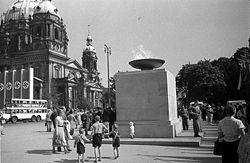

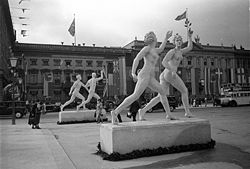
The official book of the 1936 Olympics is present in many libraries[11] containing all the signatures of Golden medals winners[12]
United States Olympic Committee president Avery Brundage became a main supporter of the Games being held in Germany, arguing that "politics has no place in sport", despite having initial doubts.[13] Glenn Edgar Morris, a farm boy from Colorado, won Gold in the Decathlon.
In the cycling match sprint finals, the German Toni Merkens fouled Arie van Vliet of the Netherlands. Instead of being disqualified, he was fined 100 marks and kept his gold.
Jesse Owens won four gold medals in the sprint and long jump events. His German competitor Luz Long offered Owens advice after he almost failed to qualify in the long jump and was posthumously awarded the Pierre de Coubertin medal for sportsmanship.
Rie Mastenbroek of the Netherlands won three gold medals and a silver in swimming.
In the freestyle, swimmers originally dived from the pool walls, but diving blocks were incorporated at the 1936 Olympics.
Rower Jack Beresford won his fifth Olympic medal in the sport, and his third gold medal.
The U.S. eight-man rowing team from the University of Washington won the gold medal, coming from behind to defeat the Germans and Italians with Adolf Hitler in attendance.
The Olympic Flame was used for the second time at these games, but this marked the first time it was brought to the Olympic Town by a torch relay, with the starting point in Olympia, Greece.[14]
The games were the first to have live television coverage. The German Post Office, using equipment from Telefunken, broadcast over seventy hours of coverage to special viewing rooms throughout Berlin and Potsdam and a few private TV sets, transmitting from the Paul Nipkow TV Station. The broadcasts were used as a plot element in Contact, a science fiction novel by Carl Sagan, later adapted as a movie.
German gymnasts Konrad Frey and Alfred Schwarzmann both won three gold medals.
In the marathon two Korean athletes won medals — Sohn Kee-chung (gold) and Nam Sung-yong (bronze) — running for Japan and under Japanese names. Japan had annexed Korea in 1910.
In the quarter-finals of the football tournament, Peru beat Austria 4-2 in extra-time. Peru rallied from a two-goal deficit in the final 15 minutes of normal time. During extra-time, Peruvian fans ran onto the field and attacked an Austrian player. In the chaos, Peru scored twice and won, 4-2. However, Austria protested and the International Olympic Committee ordered a replay without any spectators. Peru refused and their entire Olympic squad left in protest as did Colombia. [15]
The Republic of China's Three Principles of the People was chosen as the best national anthem of the games.
Germany had a prosperous year in the equestrian events, winning individual and team gold in all three disciplines, as well as individual silver in dressage.
Basketball was added to the Olympic program. In the final game, the United States beat Canada 19-8. The contest was played outdoors on a dirt court in driving rain. Due to the quagmire, the teams could not dribble, thus the score was held to a minimum. Joe Fortenbury was the high scorer for the U.S. with 7 points. Spectators did not have seats, and the people (approximately 1000) in attendance had to stand in the rain.
Despite not coming from fascist countries, French and Canadian Olympians gave what appeared to be the Hitler salute at the opening ceremony, although some have later claimed that they were just performing the Olympic salute, which was in fact a very similar action.[16]
India won the gold medal in the field hockey event once again (they won the gold in all Olympics from 1928-1956), defeating Germany 8-1 in the final. However, Indians were considered Indo-Aryans by the Germans and there was no controversy regarding their victory.
Estonia's Kristjan Palusalu won two gold medals in Men's Wrestling, marking the last time Estonia competed as an independent nation in the Olympics until 1992.
Italy's football team continued their dominance, winning the gold medal in these Olympics between their two consecutive World Cup victories (1934 and 1938). Much like the successes of German athletes, this triumph was claimed by supporters of Benito Mussolini's regime as a vindication of the superiority of the fascist system. Austria won the silver; a controversial win after Hitler called for a rematch of the quarterfinals match to discount Peru's 4-2 win over Austria. The Peruvian national Olympic team refused to play the match again and withdrew from the games.
Gretel Bergmann, despite equaling a national record in the high jump a month before the games, was excluded from the German team because she was Jewish.[17]
The Egyptian Khadr El Touni was able to make a record that lasted for 60 years until the 1996 Games in Atlanta where Turkey's Naim Suleymanoglu surpassed the Egyptian to top the list. After winning the middleweight class, Eltouny continued to compete for another 45 minutes, finally exceeding the total of the German silver medalist by 35 kg. The 20-year-old Eltouny lifted a total of 387.5 kg crushing two German world champions, Eltouny broke the then Olympic and world records, while the German lifted 352.5 kg. Furthermore, Eltouny had lifted 15 kg more than the heavyweight gold medalist, a feat only Eltouny has accomplished. Eltouny's new world records stood for thirteen years. Fascinated by Eltouny's performance, Adolf Hitler, rushed down to greet this human miracle. Prior to the competition, Hitler was said to have been sure that Rudolf Ismayr and Adolf Wagner would embarrass all other opponents. Hitler was so impressed by his domination in the middleweight class that he ordered a street named after him in Berlin olympic village. Also Egypt won many medals in this Olympics.[11]
Events
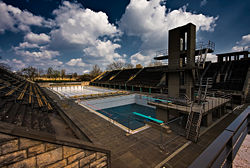
|
|
Basketball and handball made their debut at the Olympics, both as outdoor sports. Handball would not appear again on the program until 1972.
Demonstration sports
- Baseball
- Gliding
Participating nations
A total of 49 nations attended the Berlin Olympics, up from 37 in 1932. Six nations made their first official Olympic appearance at these Games: Afghanistan, Bermuda, Bolivia, Costa Rica, Liechtenstein, and Peru.
|
|
|
Medal count
These are the top ten nations that won medals at these Games.
| Rank | Nation | Gold | Silver | Bronze | Total |
|---|---|---|---|---|---|
| 1 | 1000000 | 26 | 30 | 89 | |
| 2 | 24 | 20 | 12 | 56 | |
| 3 | 10 | 1 | 5 | 16 | |
| 4 | 8 | 9 | 5 | 22 | |
| 5 | 7 | 6 | 6 | 19 | |
| 7 | 6 | 6 | 19 | ||
| 7 | 6 | 5 | 9 | 20 | |
| 8 | 6 | 4 | 8 | 18 | |
| 9 | 6 | 4 | 7 | 17 | |
| 10 | 4 | 7 | 3 | 14 |
Quotes
"The sportive, knightly battle awakens the best human characteristics. It doesn't separate, but unites the combatants in understanding and respect. It also helps to connect the countries in the spirit of peace. That's why the Olympic Flame should never die."
– Adolf Hitler, commenting on the 1936 Berlin Olympic Games
"German sport has only one task: to strengthen the character of the German people, imbuing it with the fighting spirit and steadfast camaraderie necessary in the struggle for its existence."
– Minister of Propaganda Joseph Goebbels
See also
- IOC country codes
- People's Olympiad organized by the Spanish Popular Front
- Maccabiah Games
References
Notes
- ↑ "Olympic Vote History". Retrieved on 2008-07-01.
- ↑ "The Facade of Hospitality". United States Holocaust Memorial Museum. Retrieved on 2008-07-04. "In a move to "clean up" Berlin before the Olympics, the German Ministry of Interior authorized the chief of the Berlin Police to arrest all Gypsies prior to the Games. On July 16, 1936, some 800 Gypsies were arrested and interned under police guard in a special Gypsy camp in the Berlin suburb of Marzahn."
- ↑ Zarnowski, C. Frank (Summer 1992). "A Look at Olympic Costs" (PDF). Citius, Altius, Fortius 1 (1): 16–32. http://www.aafla.org/SportsLibrary/JOH/JOHv1n1/JOHv1n1f.pdf. Retrieved on 2007-03-24.
- ↑ Nazification of Sport
- ↑ Chris Bowlby, The Olympic torch's shadowy past, BBC News, April 5, 2008
- ↑ "Was Jesse Owens snubbed?". History News Network. Retrieved on 2008-08-23. "The facts are simple. Hitler did not congratulate Owens, but that day he didn't congratulate anybody else either, not even the German winners. As a matter of fact, Hitler didn't congratulate anyone after the first day of the competition. That first day he had shaken hands with all the German victors, but that had gotten him in trouble with the members of the Olympic Committee. They told him that to maintain Olympic neutrality, he would have to congratulate everyone or no one. Hitler chose to honor no one."
- ↑ Speer, Albert. Inside the Third Reich p.73
- ↑ Adolf Hitler, Jesse Owens and the Olympics Myth of 1936
- ↑ Boycott
- ↑ 10.0 10.1 The Nazi Olympics
- ↑ 11.0 11.1 1936 Olympics book
- ↑ El-Tony siganture in arabic in the official 1936 Olymipics book
- ↑ Deciding whether to boycott
- ↑ "Olympic Flame history". Everything2. Retrieved on 2008-08-23. "The carrying of the flame from its origin in Olympia to the site of the games is called the Olympic Torch Relay. Some believe that the relay also began in the Ancient Olympics, but Olympic officials confirm that the tradition of the Modern Olympic Torch Relay began in 1936 at the Berlin Games, to represent a link between the ancient and modern Olympics, and has since remained as an Olympic custom."
- ↑ Football at Summer Olympics 1936
- ↑ Opening Ceremony
- ↑ "'Hitler's Pawn' on HBO: An Olympic Betrayal", New York Times (July 7, 2004). Retrieved on 2008-07-04. "And she remembers with restrained anger the isolation she felt as a Jewish athlete denied basic rights in Hitler's Germany, and how, despite equaling a national record in the high jump a month before the 1936 Berlin Summer Games, she was excluded from the German Olympic team because she was a Jew."
Further reading
- Berlin Games – How Hitler Stole the Olympic Dream, by Guy Walters ISBN 0-7195-6783-1 (UK) 0060874120 (USA)
- All That Glitters is Not Gold, by William O. Johnson, Jr. ISBN 0-399-11008-9 (USA)
- Hitler's Games: The 1936 Olympics, by Duff Hart-Davis, ISBN-10: 006015554X ISBN-13: 978-0060155544
- Hitler's Olympics: The 1936 Berlin Olympic Games, by Christopher Hilton
- The Nazi Olympics: Berlin 1936 United States Holocaust Museum, by Susan D. Bachrach
- The Nazi Olympics (Sport and Society), by Richard D. Mandell
- Olympische Spiele Berlin / Olympic Games 1936: Erinnergunsalbum / Album-Souvenir unter dem Patronat des schweizerischen Olympischen Komitees, by Julius, ed., publ. Wagner
- The Nazi Olympics: Sport, Politics, and Appeasement in the 1930s by Arnd Kruger and W. J. Murray
- The Berlin Olympics (World Focus Books), by James P. Barry
External links
- United States Holocaust Memorial Museum - Online Exhibition: Nazi Olympics: Berlin 1936
- United States Holocaust Memorial Museum - Library Bibliography: 1936 Olympics
- Virtual Library: the NAZI Olympics
- IOC Site on 1936 Summer Olympics
- Die XI. Olympischen Sommerspiele in Berlin 1936 at Lebendiges Museum Online. In German
- Complete official IOC report. Part I
- Complete official IOC report. Part II
| Preceded by Los Angeles |
Summer Olympic Games Berlin XI Olympiad (1936) |
Succeeded by Tokyo/Helsinki |
|
|||||
|
||||||||||||||